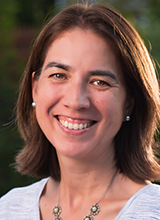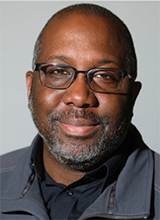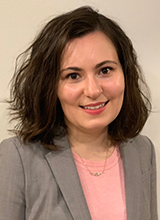
Scholarly Expertise: Addiction


Kevin Coffey
I am a behavioral neuroscientist who earned my PhD from Rutgers University and completed a postdoc here, in the Psychiatry and Behavioral Sciences Department at the University of Washington. My lab, located in the MIRECC at VA Puget Sound, aims to identify the neural mechanisms underlying substance use disorders and maladaptive decision making.
My primary focus is studying the neurobiological consequences and predictors of chronic fentanyl use. To accomplish this, I utilize cutting-edge in-vivo optical neuroscience tools (photometry, optogenetics, miniscopes) along with a newly developed oral-fentanyl self-administration model for rats and mice. I am also the lead developer for DeepSqueak, a popular software package for bioacoustics analysis that integrates machine-vision algorithms with an intuitive graphical interface to accelerate animal communication research.

Susan Stoner

Mary Hatch
Dr. Hatch is an Associate Professor at the Addictions, Drug & Alcohol Institute (ADAI), Department of Psychiatry & Behavioral Sciences, UW School of Medicine. Her research interests are in the development and testing of behavioral and pharmacologic interventions for substance use disorders and HIV prevention. In particular, her work has focused on the intersection of substance use and HIV-related sex and drug risk behaviors from both the consumer and workforce perspectives, and on implementation factors that affect uptake of interventions. She has held multiple and varied roles in research projects since 1994, and has long-standing experience developing, implementing, and overseeing large-scale multi-site clinical trials with community treatment providers. In addition to her work at the University of Washington, Dr. Hatch is a licensed clinical psychologist at UWMC Outpatient Psychiatry Clinic. Her clinical work specializes in the treatment of drug and alcohol addictions and co-occurring depression, anxiety and trauma.

Bryan Hartzler
In two decades at UW, Dr. Hartzler’s principal focus has been on the dissemination and implementation of empirically-supported health services for persons with substance use disorders. To date, this includes local, regional, national, and international collaborations, encompassing federally-funded work with diverse community-based settings (i.e., addiction care, mental health, primary and specialty medical care, criminal justice, HIV care, schools, faith-based organizations), including those affiliated with the NIDA Clinical Trials Network. As director of the UW Center for Advancing Addiction Health Services (CAAHS), he oversees a broad portfolio, including: 1) the SAMHSA-funded Northwest Addiction Technology Transfer Center (Northwest ATTC), which provides universal, targeted, and intensive technical assistance to the addiction workforce in Alaska, Idaho, Oregon, and Washington 2) regional contribution to SAMHSA’s national Opioid Response Network (ORN), 3) a host of externally-sponsored implementation projects with single-state authorities as well as other organizations, and 4) contribution to NIH-funded and intramural health services research. In professional endeavors that span a science-to-service continuum, Dr. Hartzler seeks to promote adoption and implementation of useful treatment and recovery practices in community settings where they may benefit persons with substance use disorders.

Beatriz Carlini
I am a Research Associate Professor at the Psychiatry Department, Addiction, Drug & Alcohol Institute where I direct the Cannabis Education and Research Program, a team (CERP) that systematically interacts with state and county agencies and community coalitions, with the purpose of supporting the adoption of evidence-base policies and interventions. I have published extensively in peer-reviewed journals, secured research funds both as Principal Investigator and Co-Investigator, and have collaborated with colleagues from various U.S. universities and abroad. Besides cannabis, I have interest and research experience in tobacco control.
A little bit about my trajectory: I obtained my PhD in Social Psychology in my home country, Brazil. As a faculty in the University of Sao Paulo Preventive Medicine Department, my professional life was dedicated to research and service disparate populations, such as street kids and substance-using youth. As an academic of a developing nation, I had the honor to collaborate internationally and serve in various World Health Organization working groups and committees.
After moving to the United States in 2000, I obtained a Master of Public Health at UW, with an emphasis in Social and Behavioral Sciences. This second degree provided me with the skills and the contextual perspective to successfully transition my professional focus from health care disparities in developing nations to the inequities experienced by historically marginalized communities living in the richest and most powerful country on Earth, the U.S. As a dual citizen, I consider inequity, racism, discrimination and stigma as important determinants of addiction and substance use in an increased globalized world.
I prefer the pronouns she, her, hers.

Caleb Banta-Green
Dr. Banta-Green studies substance use involving opioids and stimulants and interventions to support recovery and reduce substance-related harms. He is particularly interested in developing interventions that are accessible to all people, including those who are most marginalized, such as those who are unhoused, utilizing services syringe service programs, and/or in the criminal legal system. He provides technical assistance and evaluation services for public health and safety interventions including the website http://stopoverdose.org, and information for the general public and professionals about effective treatments at http://learnabouttreatment.org. As an epidemiologist he develops innovative approaches to measuring the use and impacts of substances as well as service utilization. His health services research involves clinical trials, implementation research, and secondary data analyses. He serves on local, state, and federal workgroups and committees related to epidemiology, policy, and interventions for illicit substance-related problems. He is a member of the U.S. Health and Human Service’s Interdepartmental Substance Use Disorders Coordinating Committee.

Anthony Floyd
Anthony is a Research Associate Professor, providing clinical trial and regulatory expertise in the treatment and prevention of substance use disorder, in particular opioid use disorder. He has directed numerous clinical trials and program evaluations in both community treatment and emergency department settings. Dr. Floyd has a secondary focus in firearm injury prevention research, which examines many of the same underlying public health concerns as substance use disorder. In addition, Anthony leads a team from Washington in a multi-site, multi-state study, examining the effectiveness of an opioid safety and education training program aimed at pharmacists in community-based settings.

Nadejda Bespalova
I am a perinatal and addiction psychiatrist and Assistant Professor in the Department of Psychiatry and Behavioral Sciences. My main area of interest and expertise is substance use disorders in the perinatal period as well as perinatal and reproductive psychiatry more generally. I am also passionate about doing my part to address inequities in healthcare.

